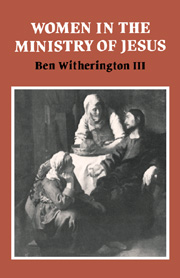 Women in the Ministry of Jesus
Women in the Ministry of Jesus Published online by Cambridge University Press: 17 August 2009
Having completed our investigation of the texts in the Gospels which deal with Jesus' attitudes toward women and their relationship to Him during His ministry, we are now in a position to correlate some of the conclusions of the various chapters of this study. We can now offer some suggestions about their possible implications for the material in the rest of the NT that deals with our subject.
Our study of Jesus' words and deeds leads us to conclude that in many, though not all, regards, Jesus differed from His Jewish contemporaries. This is all the more remarkable when we note that Jesus, so far as we know, never left His immediate Jewish environment for any length of time and, more importantly, directed His mission specifically to His fellow Jews.
Jesus' rejection of divorce outright would have offended practically everyone of His day. Further, Jesus' view that the single state was a legitimate and not abnormal calling for those to whom it was given, went against prevailing views in various parts of the Roman Empire about a man's duty to marry and procreate, but nowhere more so than in His native Palestine. We suggested that it was this teaching which made it possible for women also to assume roles other than those of wife and mother in Jesus' community.
To save this book to your Kindle, first ensure no-reply@cambridge.org is added to your Approved Personal Document E-mail List under your Personal Document Settings on the Manage Your Content and Devices page of your Amazon account. Then enter the ‘name’ part of your Kindle email address below. Find out more about saving to your Kindle.
Note you can select to save to either the @free.kindle.com or @kindle.com variations. ‘@free.kindle.com’ emails are free but can only be saved to your device when it is connected to wi-fi. ‘@kindle.com’ emails can be delivered even when you are not connected to wi-fi, but note that service fees apply.
Find out more about the Kindle Personal Document Service.
To save content items to your account, please confirm that you agree to abide by our usage policies. If this is the first time you use this feature, you will be asked to authorise Cambridge Core to connect with your account. Find out more about saving content to Dropbox.
To save content items to your account, please confirm that you agree to abide by our usage policies. If this is the first time you use this feature, you will be asked to authorise Cambridge Core to connect with your account. Find out more about saving content to Google Drive.